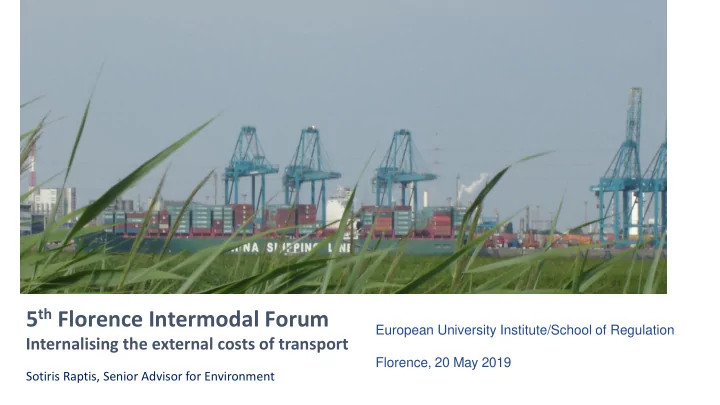

5 th Florence Intermodal Forum European University Institute/School of Regulation Internalising the external costs of transport Florence, 20 May 2019 Sotiris Raptis, Senior Advisor for Environment
European Sea Ports Organisation • Port authorities The first port of call for European transport policy ESPO • Port associations makers in Brussels • Port administrations from A knowledge network that EU and Norway drives ports to perform better • Observers: Iceland, Israel & Ukraine • Since 1993
90% of European ports are urban ports
Income of port authority • General port dues charged on ships calling at the port • Land lease fees charged to cargo handling operators • Port dues may represent half of ports’ revenues • Port dues only represent 5% up to 10% of the total cost of a ship calling at a port
Regional, national LOCAL OPERA government COM Economic TORS TRADE Growth MUNITY Geopolitical – military - strategic GENERAL digitalisation INTEREST assets SHIPPING SOCIETAL VALUES Port Social and Inland, environmental Authority dry ports,… objectives HINTERLAND BLUE ECONOMY Maritime CONNECTIONS spatial planning Decarbonisat DIGITALIS ion/Paris ATION ENERGY Agreement/ Employment DATA Energy INDUSTRY transition
Green rebates • 54% of European ports offer green discounts • Bottom-up and voluntary decision of each port • In line with their port strategy and regional environmental challenges and within their financial capacity • Port dues: essential source for port investments including green infrastructure
Green rebates • Rewarding first movers • Better market reputation • Port dues should not be used to turn ports into convenient tax collectors and undermine their financial autonomy • Port dues not a tool for internalising the external costs (environmental, accidents, congestion) of maritime shipping
Emission Control Areas
Achieving internalization objectives through non pricing measures • SOx 0.1% in SECAs • SOx 0.5% globally in 2020 • NOx Tier III standard for new ships in NECAs in 2021 • CO2 emissions at IMO & EU (MRV and GHG Strategy) • Directive on the deployment of alternative fuels infrastructure • National Emission Ceilings Directive • Ambient Air Quality Directive
Role le of ports: : In Infrastructure chall llenges • Availability of future fuels • Technical challenges in storage and bunkering for some future fuels • Availability of renewable electricity • Policy barriers - coherence
48 billion EUR investment needs in ports in coming 10 years Source: ESPO study - THE INFRASTRUCTURE INVESTMENT NEEDS AND FINANCING CHALLENGE OF EUROPEAN PORTS - 2018
Thank you for your attention! Sotiris.Raptis@espo.be
Recommend
More recommend